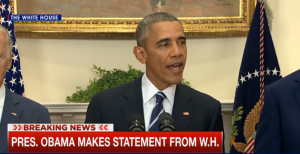Obama Rejects Keystone XL Pipeline After 7 Years Of Review
< < Go Back
Environmentalists praised the decision, which House Speaker Paul Ryan called “sickening.”
After more than a half-decade of controversy, the Obama administration on Friday rejected a permit to build the Keystone XL pipeline, an $8 billion steel straw that would have doubled the flow of oil from Canada to the Gulf Coast.
The president tried to downplay the decision, claiming that the pipeline had taken on an “overinflated role” in American politics and environmental activism alike. “This pipeline would neither be a silver bullet for the economy, as was promised by some, nor the express lane to climate disaster proclaimed by others,” Obama said in an announcement at the White House.
In an earlier speech, however, he called the pipeline’s net effect on the climate ”absolutely critical to determining whether this project is allowed to go forward.” And in his remarks on Friday, he again summoned the specter of global warming.
“If we’re going to prevent large parts of this Earth from becoming not just inhospitable, but uninhabitable,” the president said, flanked by Vice President Biden and Secretary of State John Kerry, “we must act not later, not someday, but right here, right now.”
Obama was already staking his remaining time in office on an all-out push to address the issue. But the decision to block the Keystone XL pipeline is his most significant yet, a historic win for activists and a major milestone in the politics of climate change. It marks the first time that a world leader has denied a fossil fuel project after publicly considering its effect on the Earth.
A decision to slow the expansion of oil is in line with mainstream science, which holds that if the planet is to avoid irreversible damage – and an unmanageable explosion of storms, drought, and rising tides – at least 70% of the known oil, coal and gas reserves in the world will need be left in the ground. The value of these “stranded assets” is about $100 trillion, according to a recent report by Citigroup.
But until Friday’s announcement, no world leader had ever acted on that science.
The president’s decision will set off a difficult, multi-decade debate about who gets to burn what fossil fuel, and how the companies involved should be compensated or penalized along the way. Some of that discussion will get underway on Nov. 30, the first day of the United Nation’s climate talks in Paris.
More From MSNBC:




